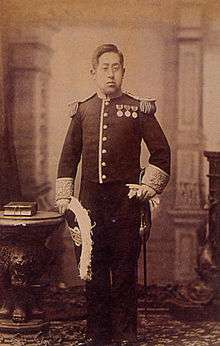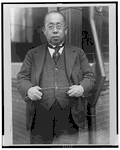Tokugawa Iesato
| Tokugawa Iesato | |
|---|---|
 | |
| Born | August 24, 1863 |
| Died | June 5, 1940 (aged 76) |
| Children | Iemasa Tokugawa, Yasuko Tokugawa, Ryōko Tokugawa, Toshiko Tokugawa |
Prince Tokugawa Iesato (徳川 家達, August 24, 1863 – June 5, 1940) was the first head of the Tokugawa clan after the overthrow of the Tokugawa bakufu, and a figure in Japanese politics during the Meiji, Taishō and early Shōwa period Japan. Tokugawa Iesato, is more commonly known as Iyesato Tokugawa.
Early life
Tokugawa Iesato was born to the Tayasu branch of the Tokugawa clan, under the name Kamenosuke, he became its 16th head, following the resignation of the last Shogun, Tokugawa Yoshinobu. His brothers were Tokugawa Satotaka and Tokugawa Takachiyo, who also held the Tayasu headship at different times. Iesato was also briefly the daimyō of the short-lived Shizuoka Domain, before the abolition of the han system in the early 1870s. His guardian at the time was Matsudaira Naritami, the former lord of the Tsuyama Domain. He was an adopted son of fourteenth shogun, Tokugawa Iemochi and his wife, Kazu-no-Miya Chikako or Seikan'in no Miya (Although Iesato was Iemochi's adopted son they only met once. Later Iemochi's foster mother, Tenshōin, raised Iesato). In 1866 he was sent to Edo Castle as Iemochi's son and being raised by Tenshoin and Kazu-no-Miya Chikako. At 1868 he was sent to Kyoto by his mother, Kazu-no-Miya Chikako and met with Emperor Meiji. He married the daughter of Konoe Tadafusa, Konoe Hiroko, who bore him Iemasa Tokugawa, the seventeenth Tokugawa family head, Yasuko Tokugawa, who married Nobusuke Takatsukasa and bore him Toshimichi Takatsukasa, Ryōko Tokugawa, and Toshiko Tokugawa.
Family
- Father: Tokugawa Yoshiyori
- Mother: Takai Takeko
- Adoptive Father: Tokugawa Iemochi
- Adoptive Mother: Kazu-no-Miya Chikako
- Wife: Konoe Hiroko (1867-1944)
- Children:
- Tokugawa Iemasa
- Tokugawa Yasuko married Nobusuke Takatsukasa
- Tokugawa Ryoko married Matsudaira Yasumasa
- Tokugawa Toshiko married Matsudaira Naokuni
Career and legacy
In 1877, Iesato was sent to Eton College in Great Britain for studies. He returned to Japan in 1882, and was given the title of kōshaku (公爵, prince) under the kazoku peerage system. He became a member of the House of Peers of the Diet of Japan from its creation in 1890, and served as President of the House of Peers from 1901-1933. When the administration of Prime Minister Yamamoto Gonnohyōe was brought down by the Siemens scandal, there was a strong movement to have Tokugawa Iesato nominated to be his successor.

Following World War I, Iesato served on the Japanese delegation to the Washington Naval Conference. His support of the United States position on the 10:10:6 division of naval strength between the United States, Great Britain and Japan drew considerable wrath from the ultra-rightist movements and conservative factions within the Imperial Japanese Navy.
Iesato is remembered for having recovered the political fortunes and reputation of the Tokugawa family, holding many senior government positions before his retirement, including a tenure as 6th head of the Japanese Red Cross Society, head of the Japan-America Society, and President of the national organizing committee for the 1940 Olympics.
Iesato Tokugawa's lifelong efforts to preserve good relations between Japan and America are honored in the historical novel The Emperor and the Spy.[1]
Iesato is quoted as once having said about his adoptive father: "Yoshinobu destroyed the Tokugawa house; I rebuilt it."
His grave is at the Tokugawa family cemetery at the temple of Kan'ei-ji in Ueno, Tokyo. He was succeeded by his son Tokugawa Iemasa (also known as Tokugawa Iyemasa).
References
- ↑ Kragen, Pam (18 May 2016). "San Diego Union Tribune Newspaper Article". Feature article in Metro and North County Editions of San Diego Union Tribune – via San Diego Union Tribune Newspaper.
Bibliography
- Banno, Junji. The Establishment of the Japanese Constitutional System. Routledge (1992). ISBN 0-415-00497-7
- Fraser, Andrew. Japan's Early Parliaments, 1890–1905. Routledge (1995). ISBN 0-415-03075-7
- Lebra, Sugiyama Takie. Above the Clouds: Status Culture of the Modern Japanese Nobility. University of California Press (1995). ISBN 0-520-07602-8
- Sims, Richard. Japanese Political History Since the Meiji Renovation 1868–2000. Palgrave Macmillan. ISBN 0-312-23915-7
External links
| Wikimedia Commons has media related to Tokugawa Iesato. |
| Preceded by Tokugawa Yoshinobu |
Tokugawa family head 1868–1940 |
Succeeded by Tokugawa Iemasa |
| Preceded by Tokugawa Takachiyo |
Tayasu-Tokugawa family head 1865–1868 |
Succeeded by Tokugawa Yoshiyori |
| Political offices | ||
|---|---|---|
| Preceded by Konoe Atsumaro |
President of the House of Peers 1903–1933 |
Succeeded by Fumimaro Konoe |